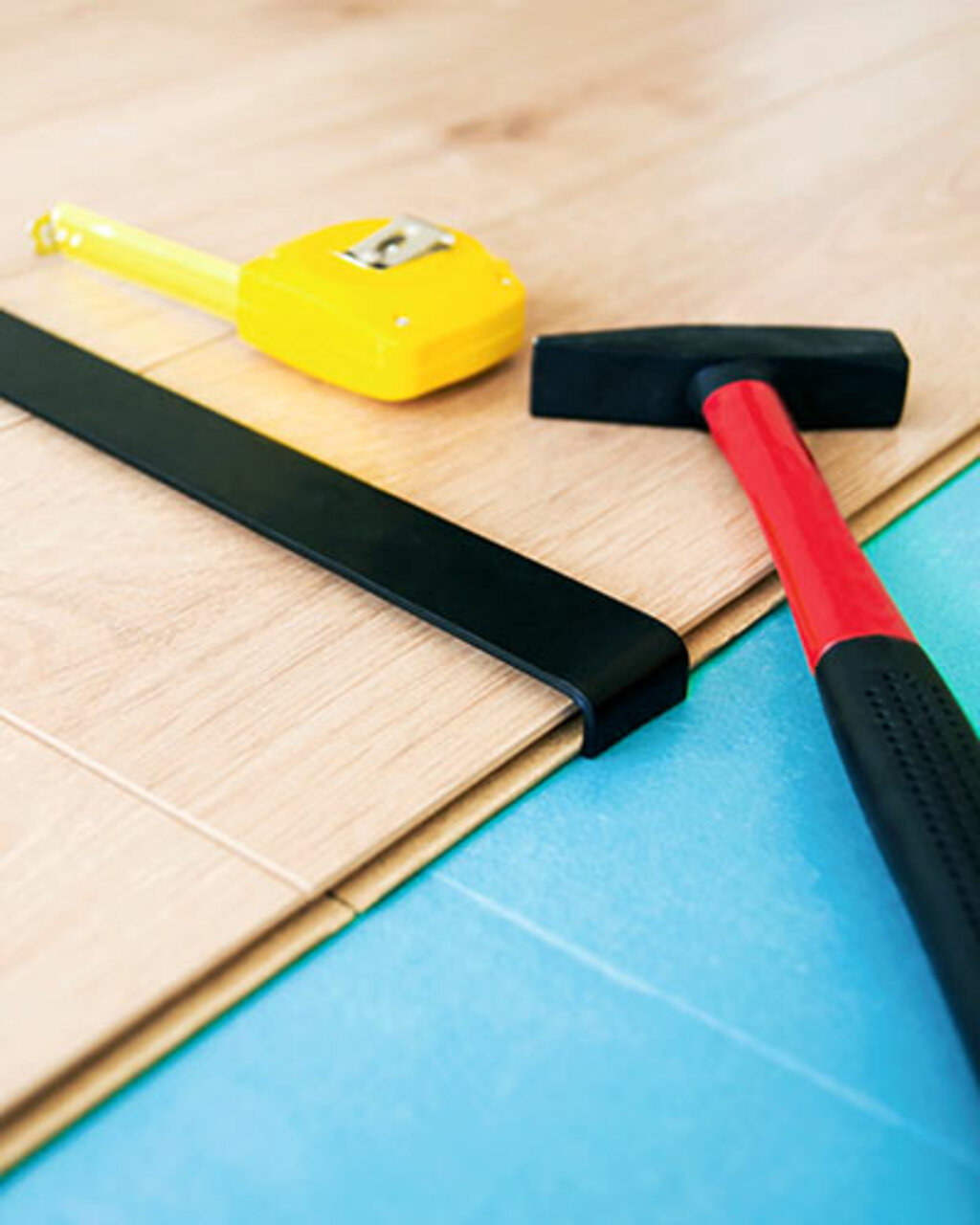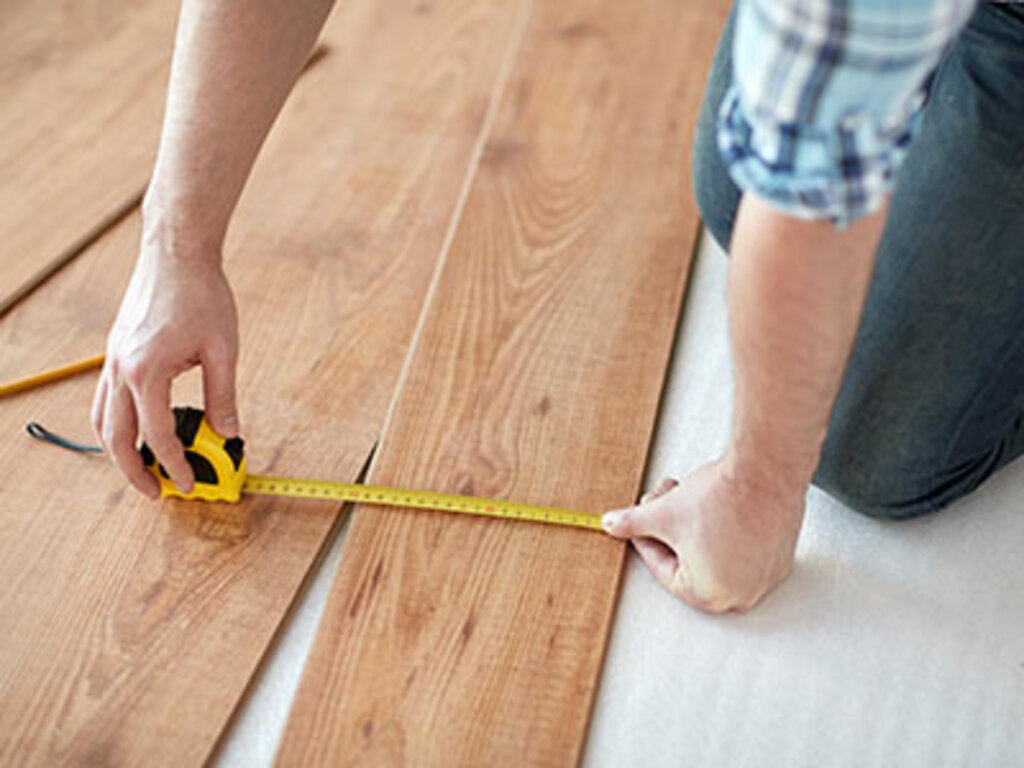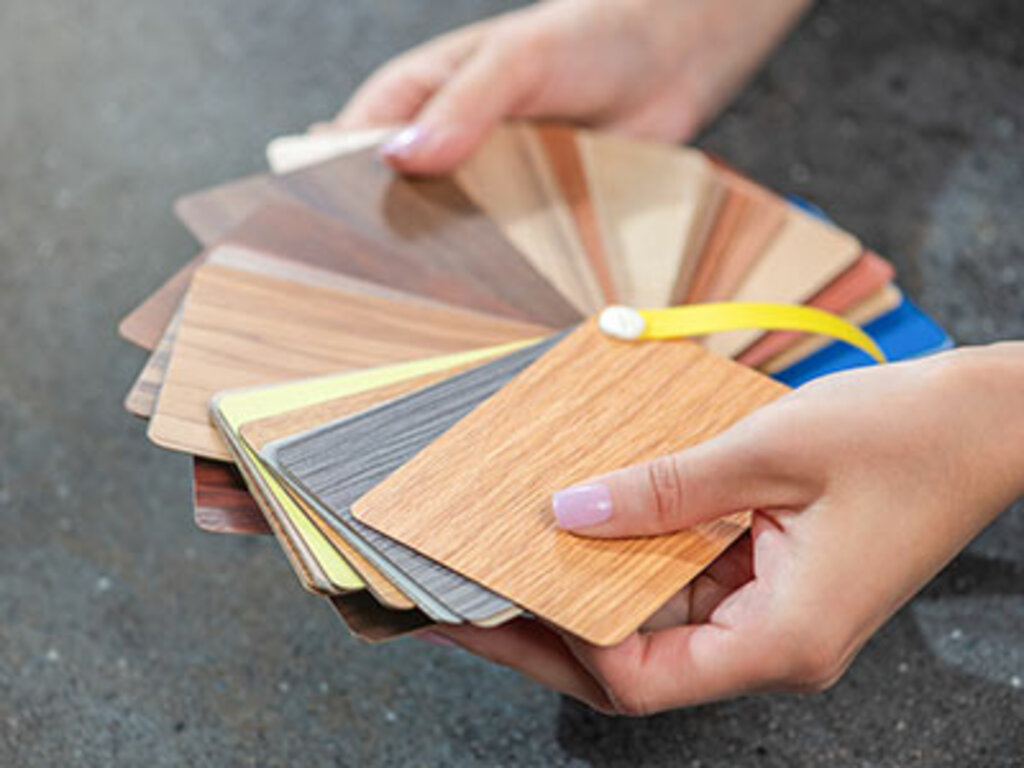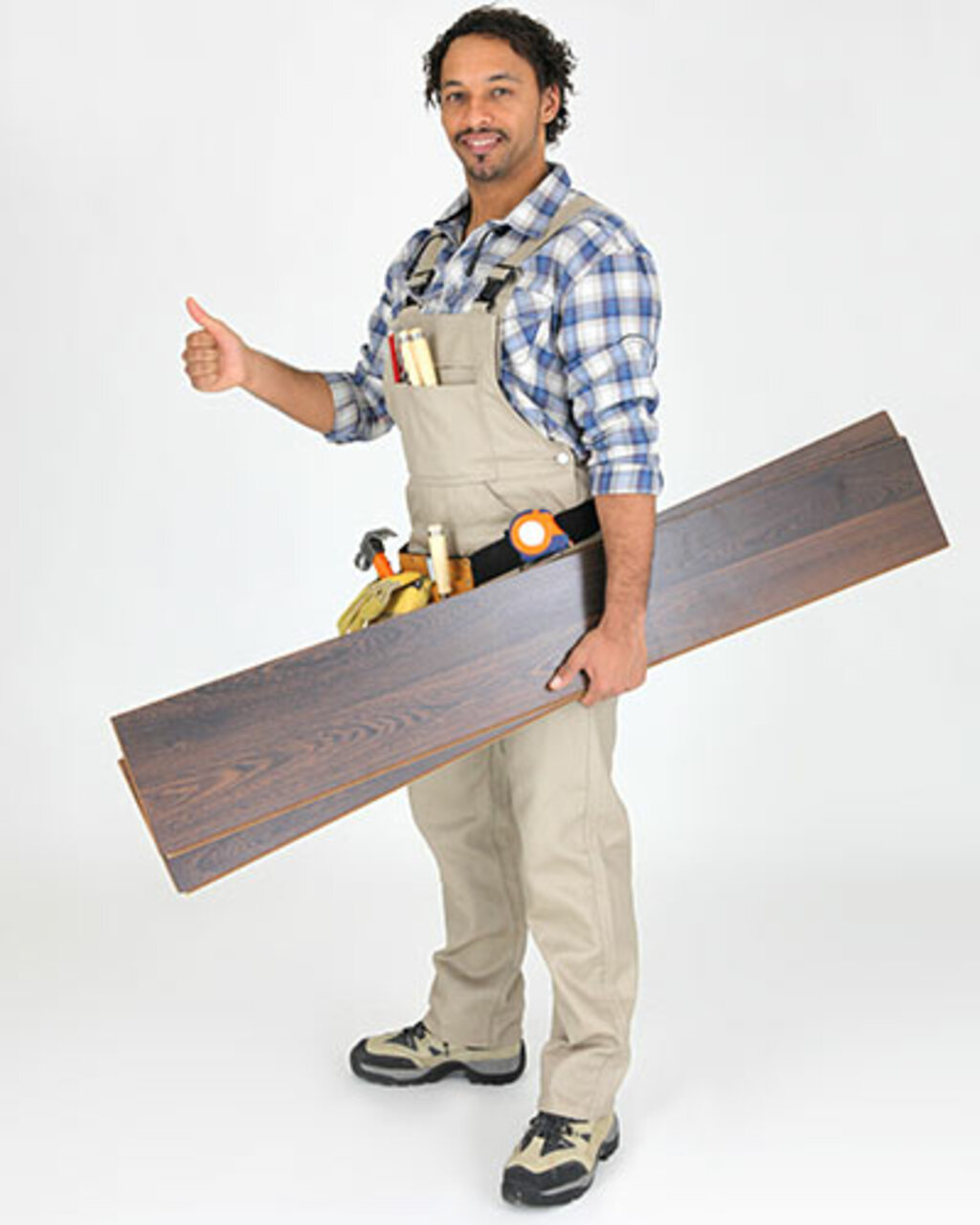Choosing Between Engineered Wood and Vinyl Flooring
 When it comes time to replace the old carpeting or worn wood floors in your home, two of the most popular flooring options to consider are engineered wood and vinyl plank. Both offer the look and feel of real hardwood but at more affordable prices. Engineered wood and luxury vinyl floors also provide increased durability and water resistance compared to solid wood.
When it comes time to replace the old carpeting or worn wood floors in your home, two of the most popular flooring options to consider are engineered wood and vinyl plank. Both offer the look and feel of real hardwood but at more affordable prices. Engineered wood and luxury vinyl floors also provide increased durability and water resistance compared to solid wood.
With so many overlapping benefits, how do you decide whether engineered hardwood or luxury vinyl tile is better for your home renovation or new construction project? What are the differences in cost, longevity, appearance, installation, and maintenance between the two?
This comprehensive guide examines all the key factors you should take into account when weighing engineered wood versus vinyl flooring. We outline the pros, cons, costs, and best uses for each option to help you make the right choice for your needs and budget. You’ll also find answers to frequently asked questions about engineered and vinyl floors.
Let’s dive in and compare engineered hardwood and vinyl plank flooring on every level!
Cost Comparison Between Engineered Wood and Vinyl Floors
One of the biggest factors when deciding between flooring types is the cost. Engineered wood and vinyl plank floors represent two of the most budget-friendly solid wood alternatives. But there are still price differences between the two worth noting.
How Much Do Engineered Wood Floors Cost Compared to Vinyl Plank?
On average, engineered wood flooring costs £30-£100 per square metre for materials. This doesn’t include professional installation. Luxury vinyl plank flooring ranges from £15-£40 per square meter for the flooring only.
There’s overlap in the material pricing, but you’ll generally pay more upfront for engineered wood. However, engineered hardwood may increase the resale value more compared to vinyl floors. Thicker engineered wood with hand-scraped detailing or custom stains will be at the high end of the pricing scale. Basic vinyl planks from home improvement stores fall on the lower end.
What Factors Impact the Costs?
For both flooring types, you’ll pay more for:
- Thicker planks (5/16” vs. 3/16”)
- Longer planks (48” vs. 36”)
- Wood-look porcelain tiles vs. vinyl planks
- Custom finishes and exotic wood species
- Commercial vs. residential grade
- Pro installation vs. DIY
Consider your budget, but also factor in longevity. Thicker floors with stronger wear layers hold up better but have higher upfront costs.
Initial Cost vs. Long-Term Value
Engineered wood floors may cost more upfront than vinyl planks. But engineered wood adds more resale value to your home and can last 50+ years with proper care. Vinyl flooring won’t necessarily increase home value and wears out faster. So engineered hardwood offers a better return on investment in the long run. But vinyl remains an affordable option for rental properties or flips.
Durability and Lifespan
How durable, long-lasting, and scratch-resistant a floor is plays a large role in determining if it’s worth the investment. Let’s compare how engineered hardwood and vinyl plank floors stack up in terms of durability and lifespan.
Expected Lifespan
With proper care and maintenance, here are the expected lifespans of each flooring:
- Engineered wood - 50+ years
- Vinyl plank - 15-30 years
Scratch and Dent Resistance
For scratches, vinyl plank floors are more resistant than engineered wood.
Engineered wood is prone to surface scratches, but resists dents and has a longer life expectancy before replacement is needed.
Regular polyurethane touch-ups help protect hardwoods. Routine vinyl cleaning is important to prevent staining.
High Traffic Area Performance
In high-traffic areas like kitchens and hallways, vinyl plank floors usually hold up better over time. Seams are less likely to separate thanks to the flexible vinyl construction.
But higher-end engineered wood with thick top veneers can handle moderate traffic for decades before refinishing is needed. Go with the thickest veneer affordable.
Moisture and Water Resistance
Vinyl plank floors win when it comes to waterproofing. The PVC vinyl is highly water resistant. Just avoid standing water.
Engineered wood has more natural wood exposed, making moisture damage and warping possible. Improved manufacturing techniques make engineered wood more stable, but vinyl is still better for kitchens and baths.
Consider water-resistant engineered wood for basements.
Overall, vinyl plank floors are more dent and water-resistant initially thanks to the flexible vinyl layer. But engineered hardwood ultimately lasts longer as a flooring investment.
Ease of Installation
 Installing new floors yourself can save big on labour costs. But some DIY projects prove more frustrating than others. How easy or challenging is it to install engineered wood versus vinyl plank flooring?
Installing new floors yourself can save big on labour costs. But some DIY projects prove more frustrating than others. How easy or challenging is it to install engineered wood versus vinyl plank flooring?
DIY Installation Difficulty
Vinyl plank flooring is widely considered one of the easiest flooring types to self-install. The lighter planks click or lock together without glue or nails. With basic tools and preparation, DIY vinyl plank installation can be accomplished in a weekend.
Engineered hardwood requires more skill to install. While it doesn’t use full-thickness solid wood, it still needs to be nailed or glued down during installation. Precise cuts are needed around door jambs and edges. DIYers can certainly install engineered wood, but allow more time.
Tools and Materials Required
For both flooring types, you’ll need basic tools like:
- Tape measure
- Utility knife
- Jigsaw or table saw
- Rubber mallet
- Pull bar
Unique supplies for each include:
Engineered wood
- Wood flooring nailer
- Flooring stapler
- Adhesive trowel
- Wood glue
Vinyl plank
- Foam underlayment
- Seam roller
Installation Time Comparison
Here are estimates for installation based on 20 square meters:
- Engineered hardwood - 2-3 days
- Vinyl plank - 1-2 days
Engineered wood takes more time due to the delicate nailing, tapping planks into alignment, and wood glue drying. Clicking vinyl planks together goes faster, but prep work levels the field.
Appearance and Styles
 A major reason homeowners choose engineered wood or luxury vinyl over carpet or tile is the attractive wood looks available. But there are differences in how convincingly each replicates real hardwood floors.
A major reason homeowners choose engineered wood or luxury vinyl over carpet or tile is the attractive wood looks available. But there are differences in how convincingly each replicates real hardwood floors.
Realistic Wood Visuals
Thanks to advanced printing technology, luxury vinyl plank floors can closely mimic wood grains, knots, and textures. But engineered hardwood offers more realistic depth and dimension thanks to the real wood veneer layer. Nothing beats real wood aesthetics.
With vinyl plank, the repeating patterns can be noticeable if you look closely. Solid wood can be sanded and refinished, unlike vinyl.
Color and Stain Options
Vinyl plank floors come in a wider variety of wood colours and shades. Any stain colour you desire can be printed. Species include oak, hickory, exotic woods, greys, and whites.
Engineered wood relies on the natural wood veneer, limiting colours compared to vinyl. But stained engineered wood has greater colour variation and depth. Custom stains offer unlimited options.
Grain Patterns and Textures
The printed layer of vinyl plank means grain patterns repeat frequently. And the texture has a uniform smoothness.
Wood veneer in engineered hardwood has more natural irregularity in the grain. Textures like hand-scraped add unique characters not easily replicated in vinyl.
Tile and Stone Visuals
One advantage of vinyl plank flooring is the ability to mimic stone and tile looks. Porcelain-look vinyl planks offer the appearance of natural stone, travertine, marble, and slate.
Engineered wood can’t match the diversity of patterns and colours outside of traditional wood species.
While vinyl plank floors have made big strides in realism, engineered hardwood still produces a more natural, high-end look. But vinyl offers far more variety.
Maintenance and Cleaning
Keeping floors looking like new requires following the proper care and cleaning practices. We’ll examine the maintenance and upkeep needs of engineered wood versus vinyl plank flooring.
Routine Cleaning
Engineered wood
Vacuum or dry mop weekly to remove grit that can scratch. Damp mop with wood-safe cleaner when needed. Limit water to prevent damage.
Vinyl plank
Sweep, then damp mop with vinyl floor cleaner weekly. Avoid abrasive scrubbing. Excess water can seep into seams.
Protecting Flooring
Engineered wood
Use furniture pads, area rugs, and diligent pet nail trimming. Refinish surfaces when worn.
Vinyl plank
Felt pads on furniture. Don't slide heavy appliances during move-ins. Prevent sun-fading with curtains.
Ability to Refinish
The wood veneer layer of engineered hardwood can be lightly sanded and refinished 1-2 times like solid wood. This maintains the “like new” appearance.
Vinyl plank flooring can't be refinished or recoated once the top vinyl wear layer becomes worn or damaged.
Potential Long-Term Issues
Engineered wood
Separating boards, cupping, and gapping if moisture issues present. Discoloration in UV exposure.
Vinyl
Fading, and yellowing of the vinyl wear layer over time. Hollow spots, compressing under appliances.
Both flooring materials need proper care and maintenance. But engineered hardwood's ability to be refinished helps maintain its durability and appearance.
Primary Pros and Cons Comparison
 We've covered a lot of details on engineered wood and vinyl plank floors. To recap, here are the main pros and cons of each flooring option:
We've covered a lot of details on engineered wood and vinyl plank floors. To recap, here are the main pros and cons of each flooring option:
Engineered Wood Floors
Pros
- Long lifespan (50+ years)
- Can be refinished
- Retains the warmth and value of real wood
- Wide variety of wood species and stains
- Resists dents better than vinyl
Cons
- Prone to surface scratches
- Moisture damage risks
- More costly upfront
- Professional installation is often needed
Vinyl Plank Floors
Pros
- Budget-friendly DIY option
- Scratch and dent-resistant
- Waterproof - good for kitchens and baths
- Wide range of wood-look colours and patterns
Cons
- Shorter lifespan (15-30 years)
- Can't be refinished
- Fake appearance on close inspection
- Fades, discolours, and compresses over time
Which Is the Better Choice Overall?
Engineered hardwood wins overall for its enduring value, ability to be refinished, and timeless real wood aesthetics. It adds value to a home. But vinyl plank remains a very viable option for DIYers on a tight budget needing a user-friendly waterproof flooring option.
Think long-term to maximise your investment. In most cases, engineered wood is the better choice for beautiful wood floors built to last decades.
Which is Better for Different Rooms?
Where the floors will be installed is an important consideration. Let's look at how engineered wood and vinyl plank compare for different rooms based on moisture, traffic, and other factors.
Kitchen Floors
Vinyl plank is typically better for kitchens thanks to the waterproof construction. Spills and messes won't damage vinyl like they can engineered wood over time.
However, new moisture-resistant engineered wood makes it suitable for kitchens as well. Go with the thickest veneer for durability.
Bathroom Floors
Similar to kitchens, vinyl plank is the best choice for bathrooms where water exposure is an issue. The rigid cores prevent warping.
Avoid engineered wood in bathrooms with frequent moisture. Failing to address leaks quickly can cause irreversible damage.
Basement Floors
Engineered hardwood's dimensional stability makes it a good option for basements prone to temperature and moisture changes. Look for engineered wood rated for basements.
Avoid vinyl plank in basements. The clicks and locking mechanisms can fail due to concrete moisture.
Living Rooms and Bedrooms
Either engineered wood or vinyl plank floors will work well in living rooms and bedrooms. Base the choice on your budget, desired aesthetics, and ease of installation.
For resale value, wood floors add more value. But waterproof vinyl provides peace of mind if you have kids or pets. Assess your needs.
High Traffic Areas
In entryways, hallways, and common areas, vinyl plank is the better choice. The durable vinyl layer resists scratches from frequent foot traffic. Fading is also less likely in sunlight.
But thick-veneer engineered wood can handle medium-traffic areas as well. Add area rugs to distribute wear and tear.
Frequently Asked Questions
Many homeowners have additional questions when weighing engineered wood against vinyl plank floors. Here are answers to some of the most common FAQs:
Is engineered wood or vinyl more eco-friendly?
Engineered wood is considered more environmentally friendly. It makes sustainable use of wood veneers. Vinyl plank contains plastics and PVC that are not biodegradable.
Which flooring is more pet-friendly?
Luxury vinyl plank floors are more scratch and moisture-resistant to pet accidents. But engineered hardwood can be refinished multiple times to undo pet damage.
Is engineered wood or vinyl cheaper?
Overall vinyl plank is the more affordable option, thanks to lower material and installation costs. But engineered wood offers long-term value recouped when selling a home.
Which flooring increases resale value more?
Engineered hardwood floors add more value at resale over the vinyl plank. Home buyers are drawn to the elegance of real wood floors. But any updated flooring adds value over older worn carpets or tile.
Is it worth paying more for thicker floors?
Yes, thicker engineered wood and vinyl with durable wear layers are worth the investment. They'll last decades longer than thin versions, saving replacement costs down the road.
Can you install either flooring over concrete?
Yes, both engineered wood and vinyl plank can be installed over concrete. But Moisture barriers, adhesive, and float installations may be required.
When choosing between engineered wood and luxury vinyl plank flooring, consider your budget, ease of installation, moisture resistance needed, and overall home value goals. The vinyl plank works well for quick DIY projects on a budget. But for long-term value and real wood aesthetics, engineered hardwood is the winner overall. Use this guide to make the optimal flooring choice for your home renovation goals and lifestyle.